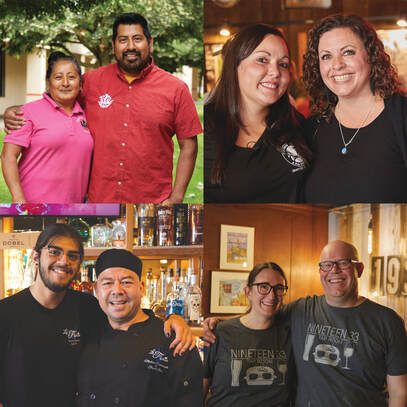 Effective today, June 30, face covering and distancing rules are eliminated in alignment with the full reopening of our economy. Governor Brown’s announcement last Friday was welcome news to Oregon's businesses ready to open back up at full capacity. Earlier this week we received confirmation from OR-OSHA Director Michael Wood that mask and distancing mandates will be eliminated (with certain exceptions, including health care, public transit, and airports). However, not all of Oregon OSHA’s COVID-19 requirements are going away immediately. "For the rule addressing all workplaces, examples of measures that will remain in place longer include optimization of ventilation, notification of a positive case in the workplace, and proper steps to take if an employee must quarantine." Here's more information to pass along: ORLA has received several questions from members regarding rule updates. Here are a few FAQs that were confirmed:
ORLA will continue to work with Oregon OSHA as part of their rules committee to continue addressing the details involved with unraveling the remainder of the COVID-19 directives. As always, you can reach out to your ORLA Regional Representative for questions. The 2021 Oregon Legislative Session was held remotely for the most part because of COVID-19 interruptions. The inability to meet in person coupled with the introduction of almost 4,000 bills this session meant there was a lot that did not get done. Legislative leadership primarily focused on police reform, housing, and social justice. For the hospitality industry, ORLA gained some victories to help our members and managed to help kill some bad bills that would have negatively impacted operators. Below is a summary of the key legislation from the 2021 session for our sector. Legislative Wins SB 317A – Allows holder of full on-premises sales license to make retail sales of mixed drinks in sealed containers for off-premises consumption.
HB 3361 (Passed) – Requires third-party food platform to enter into agreement with food place before arranging delivery of orders from food place or listing food place on application or website.
HB 3178 (Passed) – Temporarily removes condition for being deemed "unemployed" that individual's weekly remuneration for part-time work must be less than individual's weekly unemployment insurance benefit amount.
HB 3389 – Extends look-back period used to determine Unemployment Compensation Trust Fund solvency level from 10 years to 20 years.
HB 2205 (Dead) – Establishes procedure for person to bring action in name of state to recover civil penalties for violations of state law.
HB 2365 (Dead) – Prohibits food vendor from using single-use plastic food service ware when selling, serving or dispensing prepared food to consumer.
HB 2521 (Passed) – Requires transient lodging tax collector to provide invoice, receipt or other similar document that clearly sets forth sum of all transient lodging taxes charged for occupancy of transient lodging.
HB 2579 (Dead) – Increases state transient lodging tax rate and provides for transfer of moneys attributable to increase to county in which taxes were collected.
HB 2593 - Permits Office of Emergency Management to enter into agreement with nonprofit organization representing sheriffs under which organization is authorized to administer program to produce and sell outdoor recreation search and rescue cards.
HB 2818 – Allows payment from Wage Security Fund to be made to wage claimant for wages earned and unpaid in event that Commissioner of Bureau of Labor and Industries has obtained judgment in action or has issued final order in administrative proceeding for collection of wage claim.
HB 2966A – Extends grace period for repayment of nonresidential rent between April 1, 2020, and September 30, 2020, until September 30, 2021, for certain tenants.
HB 3058 (Dead) – Increases distance from certain parts of public places and places of employment in which person may not smoke, aerosolize or vaporize from 10 feet to 25 feet.
HB 3296 (Dead) – Increases privilege taxes imposed upon manufacturer or importing distributor of malt beverages, wine, or cider.
HB 3351 (Dead) – Establishes increase in statewide minimum wage rate beginning on July 1, 2022.
SB 650 (Dead) – Creates Public Assistance Protection Fund.
SB 750 (Passed) – Authorizes Oregon Liquor Control Commission to grant temporary letter of authority to eligible applicant for any license issued by commission.
HB 3177 (Dead) – Limits types of restrictions that Governor may impose on certain businesses during state of emergency related to COVID-19 pandemic.
SB 483A (Passed) – Creates rebuttable presumption that person violated prohibition against retaliation or discrimination against employee or prospective employee if person takes certain action against employee or prospective employee within 60 days after employee or prospective employee has engaged in certain protected activities.
SB 582A - Establishes producer responsibility program for packaging, printing and writing paper and food serviceware.
Other Bills SB 515 (Passed) – Requires employee of certain licensed premises who is permittee to make report if permittee has reasonable belief that sex trafficking is occurring at premises or that minor is employed or contracted as performer at premises in manner violating Oregon Liquor Control Commission rules.
SB 569A (Passed) – Makes unlawful employment practice for employer to require employee or prospective employee to possess or present valid driver license as condition of employment or continuation of employment.
For more information on ORLA's policy positions and priorities, reach out to Greg Astley, Director of Government Affairs.
There is no light switch. It will take years to build back what was lost.
FOR IMMEDIATE RELEASE: June 25, 2021 Contact: Jason Brandt, President & CEO, ORLA 503.302.5060 | [email protected] Wilsonville, OR– Today’s announcement from Governor Kate Brown announcing a full reopening of Oregon’s economy no later than Wednesday, June 30 is welcome news. Our state’s restaurant and lodging establishments have a long road ahead as small businesses continue the hard work of regaining their footing after 15 months and 13 days of historic and over-reaching government regulation. Permanent closures, workforce access issues, partial re-openings, and ever-changing administrative rules and emergency orders have left a permanent mark on the approach to doing business in Oregon. “We never could have imagined the gravity and depth to which government regulations would dictate how we live in a free society when industry shutdowns and capacity restrictions first went into effect on Tuesday, March 17 of 2020,” said Jason Brandt, President & CEO of the Oregon Restaurant & Lodging Association. “Here we are 15 months later picking up the pieces and doing whatever we can to help Oregon’s extraordinary hospitality industry find its identity once again and it will take time. From a workforce access crisis and supply chain constraints to debt accumulation and back rents and mortgages coming due, historic industry challenges remain and will persist in the years ahead.” To date, Oregon has permanently lost over 1,400 foodservice locations statewide and some lodging establishments remain closed. Both restaurant and lodging operators continue to face wide ranging marketplace dynamics resulting in different realities in different regions of the state. As a rule of thumb, the more reliant a region is on business travel, the harder the economic hit. “The Portland Metro region in particular will need ongoing support to bring back the top tier hospitality experiences our overnight guests have come to expect in our state’s largest city,” said Brandt. “Our hats are off to our partners at Travel Portland, the Portland Business Alliance, and officials at the City of Portland who are inspiring Portlanders to usher in a new transformative chapter with their ‘Here for Portland’ campaign. Ongoing cleanups, increased office worker mobility, and cultural activities can and will make a big difference. As Mayor Wheeler has said, do not bet against Portland or its people.” One challenge remains clear statewide – no matter the region, the workforce access crisis is deep and relentless. Restaurants and lodging establishments in all regions of the state are currently forced to reduce operating hours, minimize menu options and cordon off available rooms respectively. “To put it plainly, there are too many Oregonians on the sidelines,” said Brandt. “And this reality has opened up a new frontline of advocacy activity for ORLA – we must be at the table in assisting our state in addressing the child care deserts that exist in all 36 counties in Oregon, we must address the extension of unemployment benefits to those who are not making a concerted effort to find their next job, and we must protect the rights of our frontline workers who choose to wear a face covering at work and respect that choice and embrace it.” For more information on the efforts of the Oregon Restaurant & Lodging Association please visit OregonRLA.org. ### The Oregon Restaurant & Lodging Association is the leading business association for the foodservice and lodging industry in Oregon, which before COVID-19 provided over 180,000 paychecks to working Oregonians. The latest available data for May of 2021 from the Oregon Employment Department shows current employment levels in the accommodations and foodservice industry totaling 153,200 people.  Guest Blog | Portland General Electric This past year has rocked all of us, but it’s been particularly rough for small business customers. From a world-wide pandemic, a summer of social unrest, wildfires that hit too close to home, and a historical ice storm, small businesses, and especially restaurants, have endured more than their fair share of challenges. I watched as businesses were forced to change and adapt at a moment’s notice. Many were forced to lay off their staff and face an uncertain future. But even while overcoming these challenges, I was inspired by the creativity and resiliency so many demonstrated – businesses continued to serve their communities and show compassion for their neighbors with an Oregon kind of energy that’s resilient, innovative, and rooted in care for the communities they are in. It’s the kind of energy we celebrate at PGE. Hospitality, that friendly welcoming nature that we’re so proud of, is the heart of Oregon. We love where we’re from and we all are excited to share our favorite local eats and hot spots. I’ve been touched by the stories of restaurants caring for those most in need and the way that communities have stepped up to support their favorite local joints. I recently had the opportunity to sit down and visit with four local restaurants throughout the region. During our conversations, I was inspired by the stories these restaurants shared. Despite the numerous challenges, they have come to work every day and continue to be agents for positive change in their communities. To show appreciation for these restaurants and yours, we’re hosting a restaurant week on PGE’s Instagram the week of July 5. We’ll be sharing the stories of these restaurants and asking our followers to share their favorite local restaurants. Want to get in on this social boost? Share your favorite local restaurant (yours included!) on your Instagram story and tag @PortlandGeneral with the hashtag #RestaurantWeek. Thank you, ORLA, for being a great resource and unifying force for Oregon’s hospitality industry. As we continue to invest in the future of Oregon, we’re proud to make a $5,000 donation to the Oregon Hospitality Foundation. Keep up the great work! For more information on resources available for your restaurant, please visit us at portlandgeneral.com/smallbiz. | Warren Parker III, PGE Senior Marketing Strategist SMB This guest blog was submitted by Portland General Electric. For more information about ORLA and guest blog opportunities, contact Marla McColly, Business Development Director, Oregon Restaurant & Lodging Association.
Update: The National Restaurant Association hosted a webinar June 17 to discuss recent developments relating to U.S. DOL/OSHA’s Updated Guidance and the Emergency Temporary Standard (ETS), revised CDC Guidance for Vaccinated Individuals, the EEOC’s recent update of its Guidance for Vaccination and Compliance with the ADA and GINA, and what state and local “Vaccine Passports” mean for restaurants.  [Originally posted March 21, 2021] - In response to a number of inquiries on this subject, ORLA has compiled various sources of information on the topic. Please note, the following information is provided for informational purposes only, and should not be construed as legal advice. The Rundown: The vast majority of content reviewed on this subject urged caution. A number of exceptions exist within mandatory programs, including medical conditions, religious grounds and potential union bargaining (if applicable). Mandatory vaccination programs are subject to state and/or federal oversight (BOLI, OSHA, NLRB, EEOC) and can trigger program review and legal pitfalls, such as violating the Americans with Disability Act (ADA), the Genetic Information Nondiscrimination Act (GINA) and a host of potential medical, personnel and personal Data Privacy violations. Even if successful in navigating the external patchwork of state and federal agencies, an operator that chooses to adopt a mandatory vaccination program must then overcome internal operational issues, such as what steps must be taken when an employee chooses not to be vaccinated, how to then protect the rest of the workforce, reconfiguration of office space, schedule changes and the like. The Bottomline: While mandatory vaccinations are allowed, a mandatory vaccination program is not advisable. The downside seems too great of risk for operators large and small. Employers are encouraged however to promote employee self-education for vaccination acceptance, support voluntary vaccinations, follow the guidelines of local, city and state health authorities, provide their workforce the flexibility for designated group vaccination schedules and work with local Chambers and trade associations. Here is a list of resources providing information on vaccines in the workplace:
For questions, please reach out to your Regional Representative. We welcome industry members' article submissions relevant to the restaurant and lodging industry in Oregon. Association members are primarily considered and encouraged to share expertise and perspective following the guidelines below for submitting an article. Please note, we do not publish press releases. The criteria outlined below in no way guarantees your submission will be published at all, or that a submission will appear in any particular issue. The submission should satisfy the criteria, but is entirely subject to editing for length and content.
To submit an article for consideration in any of ORLA's communication vehicles please email Editor, Lori Little, at [email protected]. Guest Blog Submission Guidelines
To submit a guest blog post, contact ORLA’s Director of Business Development Marla McColly at 503.428.8694. Guest blog posts are considered sponsored opportunities. |
Categories
All
Archives
June 2024
|
Membership |
Resources |
Affiliate Partners |
Copyright 2024 Oregon Restaurant & Lodging Association. All Rights Reserved.
8565 SW Salish Lane Suite 120 | Wilsonville, OR 97070-9633 | 503.682.4422 | 800.462.0619 | Contact Us
Site Map | Accessibility | Privacy Policy
8565 SW Salish Lane Suite 120 | Wilsonville, OR 97070-9633 | 503.682.4422 | 800.462.0619 | Contact Us
Site Map | Accessibility | Privacy Policy

 RSS Feed
RSS Feed


